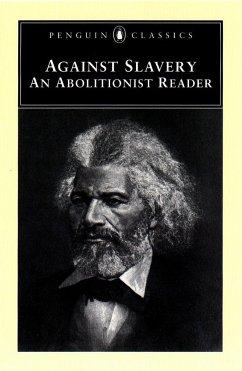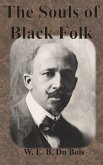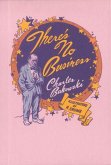Against Slavery
An Abolitionist Reader
Herausgeber: Lowance, Mason
23,99 €
inkl. MwSt.
Versandfertig in 1-2 Wochen

12 °P sammeln
Against Slavery
An Abolitionist Reader
Herausgeber: Lowance, Mason
- Broschiertes Buch
- Merkliste
- Auf die Merkliste
- Bewerten Bewerten
- Teilen
- Produkt teilen
- Produkterinnerung
- Produkterinnerung
"An invaluable resource to students, scholars, and general readers alike."-Amazon.com This colleciton assembles more than forty speeches, lectures, and essays critical to the abolitionist crusade, featuring writing by William Lloyd Garrison, Frederick Douglass, Lydia Maria Child, Wendell Phillips, Harriet Beecher Stowe, and Ralph Waldo Emerson. For more than seventy years, Penguin has been the leading publisher of classic literature in the English-speaking world. With more than 1,700 titles, Penguin Classics represents a global bookshelf of the best works throughout history and across genres…mehr
Andere Kunden interessierten sich auch für
![The Souls of Black Folk The Souls of Black Folk]() W. E. B. Du BoisThe Souls of Black Folk18,99 €
W. E. B. Du BoisThe Souls of Black Folk18,99 €![There's No Business There's No Business]() Charles BukowskiThere's No Business14,00 €
Charles BukowskiThere's No Business14,00 €![The Exiles The Exiles]() Christina Baker KlineThe Exiles8,49 €
Christina Baker KlineThe Exiles8,49 €![Interesting Times Interesting Times]() Terry PratchettInteresting Times18,99 €
Terry PratchettInteresting Times18,99 €![Good Cop/Bad Cop Good Cop/Bad Cop]() Good Cop/Bad Cop21,99 €
Good Cop/Bad Cop21,99 €![Conversations with Tim Gautreaux Conversations with Tim Gautreaux]() L Lamar NislyConversations with Tim Gautreaux33,99 €
L Lamar NislyConversations with Tim Gautreaux33,99 €![Victorian Enigmas Or Windsor Fireside Researches Victorian Enigmas Or Windsor Fireside Researches]() Charlotte Eliza CapelVictorian Enigmas Or Windsor Fireside Researches25,99 €
Charlotte Eliza CapelVictorian Enigmas Or Windsor Fireside Researches25,99 €-
-
-
"An invaluable resource to students, scholars, and general readers alike."-Amazon.com This colleciton assembles more than forty speeches, lectures, and essays critical to the abolitionist crusade, featuring writing by William Lloyd Garrison, Frederick Douglass, Lydia Maria Child, Wendell Phillips, Harriet Beecher Stowe, and Ralph Waldo Emerson. For more than seventy years, Penguin has been the leading publisher of classic literature in the English-speaking world. With more than 1,700 titles, Penguin Classics represents a global bookshelf of the best works throughout history and across genres and disciplines. Readers trust the series to provide authoritative texts enhanced by introductions and notes by distinguished scholars and contemporary authors, as well as up-to-date translations by award-winning translators.
Hinweis: Dieser Artikel kann nur an eine deutsche Lieferadresse ausgeliefert werden.
Hinweis: Dieser Artikel kann nur an eine deutsche Lieferadresse ausgeliefert werden.
Produktdetails
- Produktdetails
- Verlag: Penguin Adult Hc/Tr
- Seitenzahl: 306
- Erscheinungstermin: 1. Februar 2000
- Englisch
- Abmessung: 197mm x 129mm x 17mm
- Gewicht: 326g
- ISBN-13: 9780140437584
- ISBN-10: 0140437584
- Artikelnr.: 21277964
- Herstellerkennzeichnung
- Libri GmbH
- Europaallee 1
- 36244 Bad Hersfeld
- gpsr@libri.de
- Verlag: Penguin Adult Hc/Tr
- Seitenzahl: 306
- Erscheinungstermin: 1. Februar 2000
- Englisch
- Abmessung: 197mm x 129mm x 17mm
- Gewicht: 326g
- ISBN-13: 9780140437584
- ISBN-10: 0140437584
- Artikelnr.: 21277964
- Herstellerkennzeichnung
- Libri GmbH
- Europaallee 1
- 36244 Bad Hersfeld
- gpsr@libri.de
Edited with an Introduction by Mason Lowance
AGAINST SLAVERY: An Abolitionst Reader
CONTENTS
GENERAL INTRODUCTION
xiii
SUGGESTIONS FOR FURTHER READING
xxxvii
I. The Historical Background for Antebellum Abolitionism, 1700-1830
Introduction
3
Samuel Sewall, The Selling of Joseph (1700)
11
John Saffin, A Brief Candid Answer to The Selling of Joseph (1701)
15
Cotton Mather, The Negro Christianized (1706)
18
John Woolman, Some Considerations on the Keeping of Negroes (1754 and 1762)
21
Phillis Wheatley, "On Being Brought from Africa to America" (1773)
25
Thomas Jefferson, from the Declaration of Independence (1776)
28
Joseph Story, "Charge to the Grand Jury of Maine, May 8, 1820"
29
Frederick Douglass, "What to the Slave Is the Fourth of July?" (1852)
38
II. The Biblical Antislavery Arguments
Introduction
49
Theodore Dwight Weld, The Bible Against Slavery (1837)
53
Alexander Crummell, "An Address to the British Antislavery Society" (1851)
59
James Freeman Clarke, Slavery in the United States (1843)
63
Alexander McLeod, Negro Slavery Unjustifiable (1802 and 1846)
70
Robert Dale Owen, The Wrong of Slavery (1864)
81
III. The Abolitionist Crusade, 1830-1865
Introduction
87
William Lloyd Garrison, "An Address to the American Colonization Society"
(1829)
92
Garrison, "Commencement of The Liberator," editorial (1831)
103
Garrison, "Truisms" (1831)
105
Garrison, "Henry Clay's Colonization Address" (1830)
108
Garrison, "The Great [Constitutional] Crisis" (1832)
112
Garrison, "American Colorphobia" (1847)
117
Garrison, "Declaration of the National Antislavery Convention" (1833)
119
Garrison, "Speech at the Fourth National Women's Rights Convention" (1853)
122
Garrison, "No Compromise with Slavery" (1854)
125
David Walker, An Appeal to the Colored Citizens of the World (1829)
131
John Greenleaf Whittier, "Massachusetts to Virginia" (1843)
144
Whittier, Justice and Expediency (1833)
149
Lydia Maria Child, An Appeal in Favor of That Class of Americans Called
Africans (1833)
154
William Ellery Channing, Slavery (1835)
176
Gerrit Smith, "Letter to the Rev. Smylie" (1837)
192
Angelina Grimké, An Appeal to the Christian Women of the South (1836)
197
Sarah Moore Grimké, "An Epistle to the Clergy of the Southern States"
(1836)
203
Catherine E. Beecher, An Essay on Slavery and Abolitionism (1837)
207
Angelina Grimké, Letters to Catherine E. Beecher, in Reply to an Essay on
Slavery and Abolitionism (1838)
220
Theodore Dwight Weld, American Slavery As It Is (1839)
224
Rev. Roy Sunderland, An Antislavery Manual (1837)
228
Horace Bushnell, "A Discourse on the Slavery Question" (1839)
229
James McCune Smith, The Destiny of a People of Color (1843)
235
Wendell Phillips, The Constitution, a Pro-Slavery Compact (1845)
241
Phillips, Philosophy of the Abolition Movement (1853)
246
Lysander Spooner, The Unconstitutionality of Slavery (1845)
252
James Russell Lowell, "Mr. Calhoun's Report," from The National Antislavery
Standard, February 15,1849
258
Lowell, "The Abolitionists and Emancipation," from The National Antislavery
Standard, March 1, 1849
258
Lowell, "Politics and the Pulpit," from The National Antislavery Standard,
January 25, 1849
259
Lowell, "The Church and the Clergy," from The National Antislavery
Standard, February 27, 1845
260
Lowell, "The Church and the Clergy Again," from The National Antislavery
Standard, March 27, 1845
261
Lowell, "Daniel Webster," from The National Antislavery Standard, July 2,
1846
262
Lowell, "The Moral Movement Against Slavery," from The National Antislavery
Standard, February 22, 1849
264
Horace Mann, "Speech on the Institution of Slavery" (1852)
266
Theodore Parker, The Function and Place of Conscience in Relation to the
Laws of Men (1850), ed. Dean Grodzins
273
Parker, "Present Aspect of the Antislavery Enterprise," Speech to the
American Antislavery Society (1856), ed. Dean Grodzins
285
Harrier Beecher Stowe, "Concluding Remarks," from Uncle Tom's Cabin (1852)
291
Mary Eastman, from Aunt Phillis's Cabin (1852)
296
Ralph Waldo Emerson, "Lecture on Slavery" (1855), ed. William Pannapacker
301
Charles Summer, The Barbarism of Slavery (1860)
313
Acts of Congress Relating to Slavery, Embracing the Fugitive Slave Law of
1793, the Missouri Compromise Act of 1820, the Fugitive Slave Law of 1850,
the Ordinance of 1787, and the Wilmot Proviso of 1847
321
CONTENTS
GENERAL INTRODUCTION
xiii
SUGGESTIONS FOR FURTHER READING
xxxvii
I. The Historical Background for Antebellum Abolitionism, 1700-1830
Introduction
3
Samuel Sewall, The Selling of Joseph (1700)
11
John Saffin, A Brief Candid Answer to The Selling of Joseph (1701)
15
Cotton Mather, The Negro Christianized (1706)
18
John Woolman, Some Considerations on the Keeping of Negroes (1754 and 1762)
21
Phillis Wheatley, "On Being Brought from Africa to America" (1773)
25
Thomas Jefferson, from the Declaration of Independence (1776)
28
Joseph Story, "Charge to the Grand Jury of Maine, May 8, 1820"
29
Frederick Douglass, "What to the Slave Is the Fourth of July?" (1852)
38
II. The Biblical Antislavery Arguments
Introduction
49
Theodore Dwight Weld, The Bible Against Slavery (1837)
53
Alexander Crummell, "An Address to the British Antislavery Society" (1851)
59
James Freeman Clarke, Slavery in the United States (1843)
63
Alexander McLeod, Negro Slavery Unjustifiable (1802 and 1846)
70
Robert Dale Owen, The Wrong of Slavery (1864)
81
III. The Abolitionist Crusade, 1830-1865
Introduction
87
William Lloyd Garrison, "An Address to the American Colonization Society"
(1829)
92
Garrison, "Commencement of The Liberator," editorial (1831)
103
Garrison, "Truisms" (1831)
105
Garrison, "Henry Clay's Colonization Address" (1830)
108
Garrison, "The Great [Constitutional] Crisis" (1832)
112
Garrison, "American Colorphobia" (1847)
117
Garrison, "Declaration of the National Antislavery Convention" (1833)
119
Garrison, "Speech at the Fourth National Women's Rights Convention" (1853)
122
Garrison, "No Compromise with Slavery" (1854)
125
David Walker, An Appeal to the Colored Citizens of the World (1829)
131
John Greenleaf Whittier, "Massachusetts to Virginia" (1843)
144
Whittier, Justice and Expediency (1833)
149
Lydia Maria Child, An Appeal in Favor of That Class of Americans Called
Africans (1833)
154
William Ellery Channing, Slavery (1835)
176
Gerrit Smith, "Letter to the Rev. Smylie" (1837)
192
Angelina Grimké, An Appeal to the Christian Women of the South (1836)
197
Sarah Moore Grimké, "An Epistle to the Clergy of the Southern States"
(1836)
203
Catherine E. Beecher, An Essay on Slavery and Abolitionism (1837)
207
Angelina Grimké, Letters to Catherine E. Beecher, in Reply to an Essay on
Slavery and Abolitionism (1838)
220
Theodore Dwight Weld, American Slavery As It Is (1839)
224
Rev. Roy Sunderland, An Antislavery Manual (1837)
228
Horace Bushnell, "A Discourse on the Slavery Question" (1839)
229
James McCune Smith, The Destiny of a People of Color (1843)
235
Wendell Phillips, The Constitution, a Pro-Slavery Compact (1845)
241
Phillips, Philosophy of the Abolition Movement (1853)
246
Lysander Spooner, The Unconstitutionality of Slavery (1845)
252
James Russell Lowell, "Mr. Calhoun's Report," from The National Antislavery
Standard, February 15,1849
258
Lowell, "The Abolitionists and Emancipation," from The National Antislavery
Standard, March 1, 1849
258
Lowell, "Politics and the Pulpit," from The National Antislavery Standard,
January 25, 1849
259
Lowell, "The Church and the Clergy," from The National Antislavery
Standard, February 27, 1845
260
Lowell, "The Church and the Clergy Again," from The National Antislavery
Standard, March 27, 1845
261
Lowell, "Daniel Webster," from The National Antislavery Standard, July 2,
1846
262
Lowell, "The Moral Movement Against Slavery," from The National Antislavery
Standard, February 22, 1849
264
Horace Mann, "Speech on the Institution of Slavery" (1852)
266
Theodore Parker, The Function and Place of Conscience in Relation to the
Laws of Men (1850), ed. Dean Grodzins
273
Parker, "Present Aspect of the Antislavery Enterprise," Speech to the
American Antislavery Society (1856), ed. Dean Grodzins
285
Harrier Beecher Stowe, "Concluding Remarks," from Uncle Tom's Cabin (1852)
291
Mary Eastman, from Aunt Phillis's Cabin (1852)
296
Ralph Waldo Emerson, "Lecture on Slavery" (1855), ed. William Pannapacker
301
Charles Summer, The Barbarism of Slavery (1860)
313
Acts of Congress Relating to Slavery, Embracing the Fugitive Slave Law of
1793, the Missouri Compromise Act of 1820, the Fugitive Slave Law of 1850,
the Ordinance of 1787, and the Wilmot Proviso of 1847
321
AGAINST SLAVERY: An Abolitionst Reader
CONTENTS
GENERAL INTRODUCTION
xiii
SUGGESTIONS FOR FURTHER READING
xxxvii
I. The Historical Background for Antebellum Abolitionism, 1700-1830
Introduction
3
Samuel Sewall, The Selling of Joseph (1700)
11
John Saffin, A Brief Candid Answer to The Selling of Joseph (1701)
15
Cotton Mather, The Negro Christianized (1706)
18
John Woolman, Some Considerations on the Keeping of Negroes (1754 and 1762)
21
Phillis Wheatley, "On Being Brought from Africa to America" (1773)
25
Thomas Jefferson, from the Declaration of Independence (1776)
28
Joseph Story, "Charge to the Grand Jury of Maine, May 8, 1820"
29
Frederick Douglass, "What to the Slave Is the Fourth of July?" (1852)
38
II. The Biblical Antislavery Arguments
Introduction
49
Theodore Dwight Weld, The Bible Against Slavery (1837)
53
Alexander Crummell, "An Address to the British Antislavery Society" (1851)
59
James Freeman Clarke, Slavery in the United States (1843)
63
Alexander McLeod, Negro Slavery Unjustifiable (1802 and 1846)
70
Robert Dale Owen, The Wrong of Slavery (1864)
81
III. The Abolitionist Crusade, 1830-1865
Introduction
87
William Lloyd Garrison, "An Address to the American Colonization Society"
(1829)
92
Garrison, "Commencement of The Liberator," editorial (1831)
103
Garrison, "Truisms" (1831)
105
Garrison, "Henry Clay's Colonization Address" (1830)
108
Garrison, "The Great [Constitutional] Crisis" (1832)
112
Garrison, "American Colorphobia" (1847)
117
Garrison, "Declaration of the National Antislavery Convention" (1833)
119
Garrison, "Speech at the Fourth National Women's Rights Convention" (1853)
122
Garrison, "No Compromise with Slavery" (1854)
125
David Walker, An Appeal to the Colored Citizens of the World (1829)
131
John Greenleaf Whittier, "Massachusetts to Virginia" (1843)
144
Whittier, Justice and Expediency (1833)
149
Lydia Maria Child, An Appeal in Favor of That Class of Americans Called
Africans (1833)
154
William Ellery Channing, Slavery (1835)
176
Gerrit Smith, "Letter to the Rev. Smylie" (1837)
192
Angelina Grimké, An Appeal to the Christian Women of the South (1836)
197
Sarah Moore Grimké, "An Epistle to the Clergy of the Southern States"
(1836)
203
Catherine E. Beecher, An Essay on Slavery and Abolitionism (1837)
207
Angelina Grimké, Letters to Catherine E. Beecher, in Reply to an Essay on
Slavery and Abolitionism (1838)
220
Theodore Dwight Weld, American Slavery As It Is (1839)
224
Rev. Roy Sunderland, An Antislavery Manual (1837)
228
Horace Bushnell, "A Discourse on the Slavery Question" (1839)
229
James McCune Smith, The Destiny of a People of Color (1843)
235
Wendell Phillips, The Constitution, a Pro-Slavery Compact (1845)
241
Phillips, Philosophy of the Abolition Movement (1853)
246
Lysander Spooner, The Unconstitutionality of Slavery (1845)
252
James Russell Lowell, "Mr. Calhoun's Report," from The National Antislavery
Standard, February 15,1849
258
Lowell, "The Abolitionists and Emancipation," from The National Antislavery
Standard, March 1, 1849
258
Lowell, "Politics and the Pulpit," from The National Antislavery Standard,
January 25, 1849
259
Lowell, "The Church and the Clergy," from The National Antislavery
Standard, February 27, 1845
260
Lowell, "The Church and the Clergy Again," from The National Antislavery
Standard, March 27, 1845
261
Lowell, "Daniel Webster," from The National Antislavery Standard, July 2,
1846
262
Lowell, "The Moral Movement Against Slavery," from The National Antislavery
Standard, February 22, 1849
264
Horace Mann, "Speech on the Institution of Slavery" (1852)
266
Theodore Parker, The Function and Place of Conscience in Relation to the
Laws of Men (1850), ed. Dean Grodzins
273
Parker, "Present Aspect of the Antislavery Enterprise," Speech to the
American Antislavery Society (1856), ed. Dean Grodzins
285
Harrier Beecher Stowe, "Concluding Remarks," from Uncle Tom's Cabin (1852)
291
Mary Eastman, from Aunt Phillis's Cabin (1852)
296
Ralph Waldo Emerson, "Lecture on Slavery" (1855), ed. William Pannapacker
301
Charles Summer, The Barbarism of Slavery (1860)
313
Acts of Congress Relating to Slavery, Embracing the Fugitive Slave Law of
1793, the Missouri Compromise Act of 1820, the Fugitive Slave Law of 1850,
the Ordinance of 1787, and the Wilmot Proviso of 1847
321
CONTENTS
GENERAL INTRODUCTION
xiii
SUGGESTIONS FOR FURTHER READING
xxxvii
I. The Historical Background for Antebellum Abolitionism, 1700-1830
Introduction
3
Samuel Sewall, The Selling of Joseph (1700)
11
John Saffin, A Brief Candid Answer to The Selling of Joseph (1701)
15
Cotton Mather, The Negro Christianized (1706)
18
John Woolman, Some Considerations on the Keeping of Negroes (1754 and 1762)
21
Phillis Wheatley, "On Being Brought from Africa to America" (1773)
25
Thomas Jefferson, from the Declaration of Independence (1776)
28
Joseph Story, "Charge to the Grand Jury of Maine, May 8, 1820"
29
Frederick Douglass, "What to the Slave Is the Fourth of July?" (1852)
38
II. The Biblical Antislavery Arguments
Introduction
49
Theodore Dwight Weld, The Bible Against Slavery (1837)
53
Alexander Crummell, "An Address to the British Antislavery Society" (1851)
59
James Freeman Clarke, Slavery in the United States (1843)
63
Alexander McLeod, Negro Slavery Unjustifiable (1802 and 1846)
70
Robert Dale Owen, The Wrong of Slavery (1864)
81
III. The Abolitionist Crusade, 1830-1865
Introduction
87
William Lloyd Garrison, "An Address to the American Colonization Society"
(1829)
92
Garrison, "Commencement of The Liberator," editorial (1831)
103
Garrison, "Truisms" (1831)
105
Garrison, "Henry Clay's Colonization Address" (1830)
108
Garrison, "The Great [Constitutional] Crisis" (1832)
112
Garrison, "American Colorphobia" (1847)
117
Garrison, "Declaration of the National Antislavery Convention" (1833)
119
Garrison, "Speech at the Fourth National Women's Rights Convention" (1853)
122
Garrison, "No Compromise with Slavery" (1854)
125
David Walker, An Appeal to the Colored Citizens of the World (1829)
131
John Greenleaf Whittier, "Massachusetts to Virginia" (1843)
144
Whittier, Justice and Expediency (1833)
149
Lydia Maria Child, An Appeal in Favor of That Class of Americans Called
Africans (1833)
154
William Ellery Channing, Slavery (1835)
176
Gerrit Smith, "Letter to the Rev. Smylie" (1837)
192
Angelina Grimké, An Appeal to the Christian Women of the South (1836)
197
Sarah Moore Grimké, "An Epistle to the Clergy of the Southern States"
(1836)
203
Catherine E. Beecher, An Essay on Slavery and Abolitionism (1837)
207
Angelina Grimké, Letters to Catherine E. Beecher, in Reply to an Essay on
Slavery and Abolitionism (1838)
220
Theodore Dwight Weld, American Slavery As It Is (1839)
224
Rev. Roy Sunderland, An Antislavery Manual (1837)
228
Horace Bushnell, "A Discourse on the Slavery Question" (1839)
229
James McCune Smith, The Destiny of a People of Color (1843)
235
Wendell Phillips, The Constitution, a Pro-Slavery Compact (1845)
241
Phillips, Philosophy of the Abolition Movement (1853)
246
Lysander Spooner, The Unconstitutionality of Slavery (1845)
252
James Russell Lowell, "Mr. Calhoun's Report," from The National Antislavery
Standard, February 15,1849
258
Lowell, "The Abolitionists and Emancipation," from The National Antislavery
Standard, March 1, 1849
258
Lowell, "Politics and the Pulpit," from The National Antislavery Standard,
January 25, 1849
259
Lowell, "The Church and the Clergy," from The National Antislavery
Standard, February 27, 1845
260
Lowell, "The Church and the Clergy Again," from The National Antislavery
Standard, March 27, 1845
261
Lowell, "Daniel Webster," from The National Antislavery Standard, July 2,
1846
262
Lowell, "The Moral Movement Against Slavery," from The National Antislavery
Standard, February 22, 1849
264
Horace Mann, "Speech on the Institution of Slavery" (1852)
266
Theodore Parker, The Function and Place of Conscience in Relation to the
Laws of Men (1850), ed. Dean Grodzins
273
Parker, "Present Aspect of the Antislavery Enterprise," Speech to the
American Antislavery Society (1856), ed. Dean Grodzins
285
Harrier Beecher Stowe, "Concluding Remarks," from Uncle Tom's Cabin (1852)
291
Mary Eastman, from Aunt Phillis's Cabin (1852)
296
Ralph Waldo Emerson, "Lecture on Slavery" (1855), ed. William Pannapacker
301
Charles Summer, The Barbarism of Slavery (1860)
313
Acts of Congress Relating to Slavery, Embracing the Fugitive Slave Law of
1793, the Missouri Compromise Act of 1820, the Fugitive Slave Law of 1850,
the Ordinance of 1787, and the Wilmot Proviso of 1847
321







